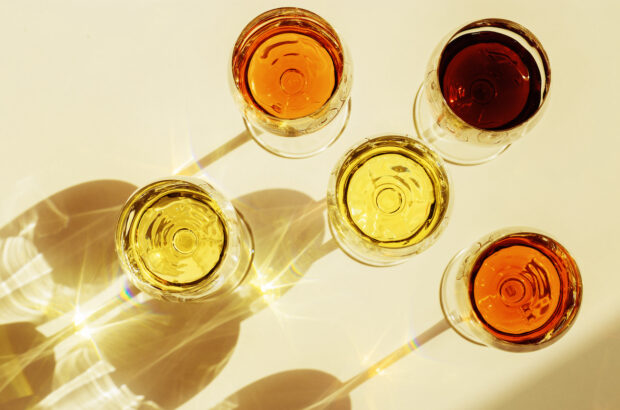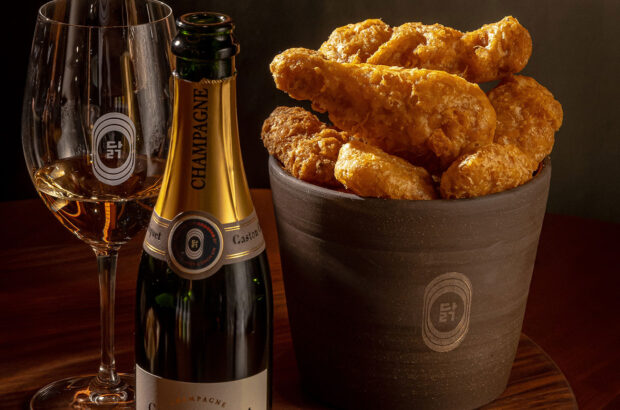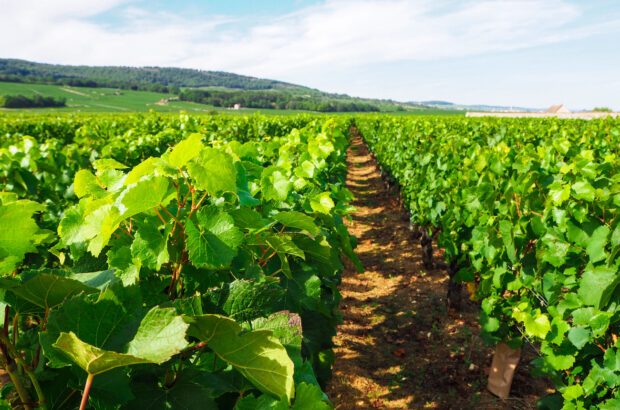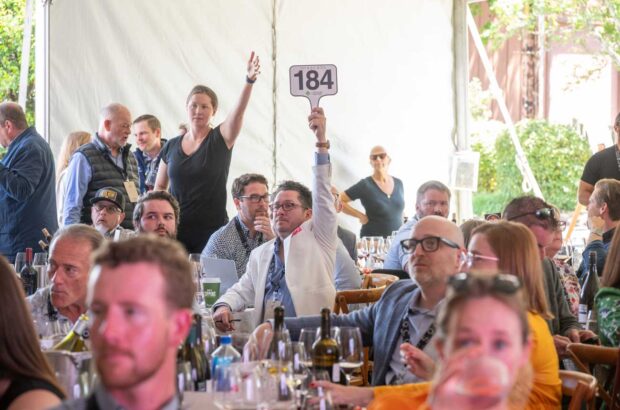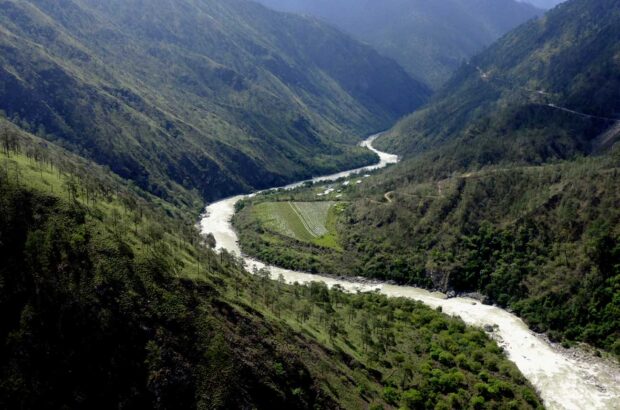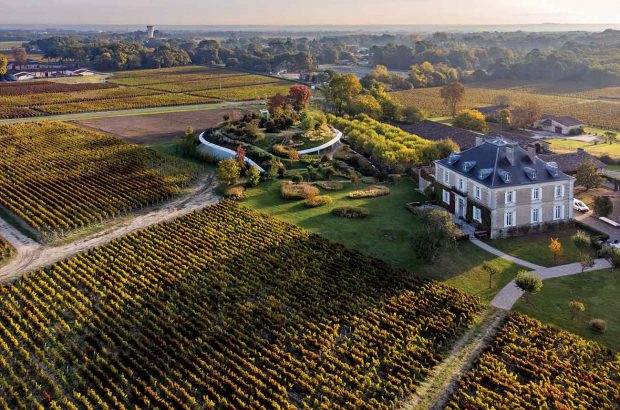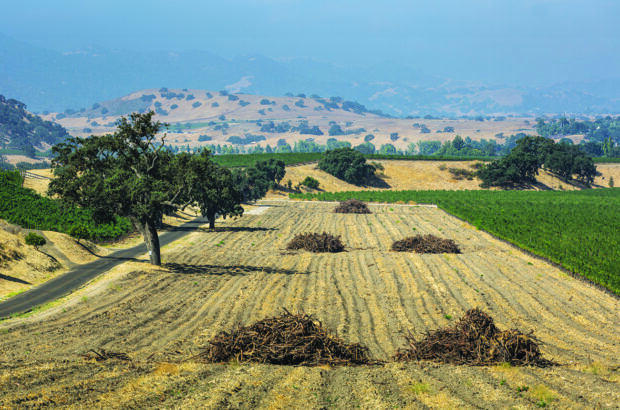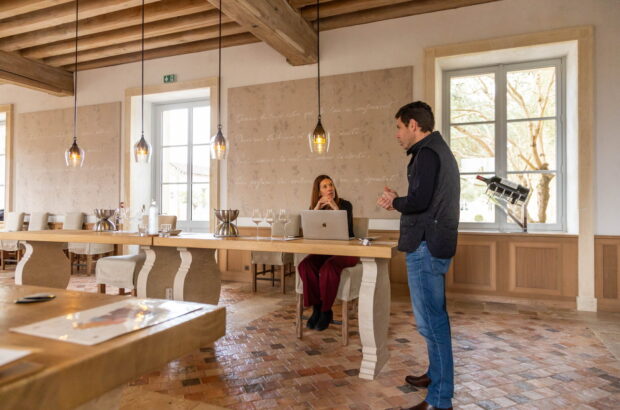Onwards, upwards. The roads get narrower, the corners get tighter. I step out of the car when I finally reach the winery and the air is so much fresher here. I go to take a sip from my water bottle and a gust of wind makes it whistle.
I stand with Thomas Jullien and we look over the vineyards. It’s not yet spring, and the vines look little more than sticks.
‘It’s a lunar landscape at the moment,’ he says, as a friend’s flock of 300 sheep has just passed through to graze on every scrap of green between the rows.
Thomas is something of a mountain goat himself; wiry, energetic and youthful but whiskery.
The town of Beaumes de Venise gives its name to two appellations. Muscat de Beaumes de Venise is made at the foot of the mountain, but Beaumes de Venise tout court refers to the dry red wines made higher up – this is where Domaine La Ferme St-Martin can be found.
Scroll down for notes and scores for 11 Domaine La Ferme St-Martin wines

The views at Domaine La Ferme St-Martin. Credit: Matt Walls
With panoramic views like the one above, you can see why Thomas’ grandfather, Aimé Jullien, first bought this farm with his wife Yvonne back in 1955. They must have felt proud and optimistic, surveying their orchards of cherry trees, apricot trees, olive trees, and vines.
That winter, a devastating frost killed all their trees and vines.
To replant the fruit trees, they would have had to wait 10-15 years for a crop. The other option was to replant the entire estate with vines, which take just three or four years to produce. Financially speaking, there was no real decision to make.
In 1980, Thomas’ father Guy joined the estate aged just 20, and it was he who took the estate down a more non-interventionist path, starting by working organically. Thomas joined in 2005, and they worked together until Thomas and his wife Sophie took over fully in 2020.
Adapting to the heat
It might be cooler up here, but like everywhere else, it’s hotting up. ‘Vignerons must adapt,’ says Thomas, and his response is to plant late-ripening varieties with low potential alcohol, such as Counoise, Terret Noir, Aramon, Piquepoul Noir, Piquepoul Blanc and Carignan Blanc.
Of Terret Noir, he says ‘they’re the grapes I like to eat; crunchy, fresh, with a fine skin and lots of personality.’ It ripens three weeks later than Grenache, but with the same acidity, and at much lower alcohol levels. He’s also a big fan of Counoise, which is ‘spicier, with good colour, and is very resilient.’
The result is that his main red cuvée, Terres Jaunes, now typically comes in at 13.5% alcohol, instead of the 14.5% it did before.
He recognises that Grenache is ‘the greatest grape we have in the Rhône Valley, but we need other things’. As for Syrah, the prospect is daunting: ‘in parts of the southern Rhône, in 10 years it will be finished.’

Doamine La Ferme St-Martin. Credit: Matt Walls
Creating a ‘transparent, authentic and drinkable style’
He doesn’t use synthetic products in the vineyard or the winery; he doesn’t add cultured yeasts, tartaric acid, or even water. Some cuvées get small doses of sulphur at bottling, others don’t; he says he sometimes prefers those with, rather than without.
‘That’s what interests me, making a wine that is enjoyed as much by the natural wine lover as someone who buys wine from the supermarket.’
The way he works in the cellar helps to channel this transparent, authentic and drinkable style throughout his range – gentle extraction, limited use of oak, and filtering only the bottom section of his tanks.
Thomas has also introduced a négociant range, identifiable by the stick man on the labels. His thoughtful approach is carried through to these wines too. He buys only organic, hand-picked grapes, grown from the same plots each year, all of which are less than 1.5km from his winery, and he makes these wines without artificial products.
Like the rest of his wines, they display great winemaking proficiency, and are designed above all to be drunk.
That said, it’s his Beaumes de Venise reds that make the most profound impression. All are worth buying, and most are under £20 a bottle. They are undeniably Rhône, but Thomas somehow makes weightless wines from this other-worldly terroir.



